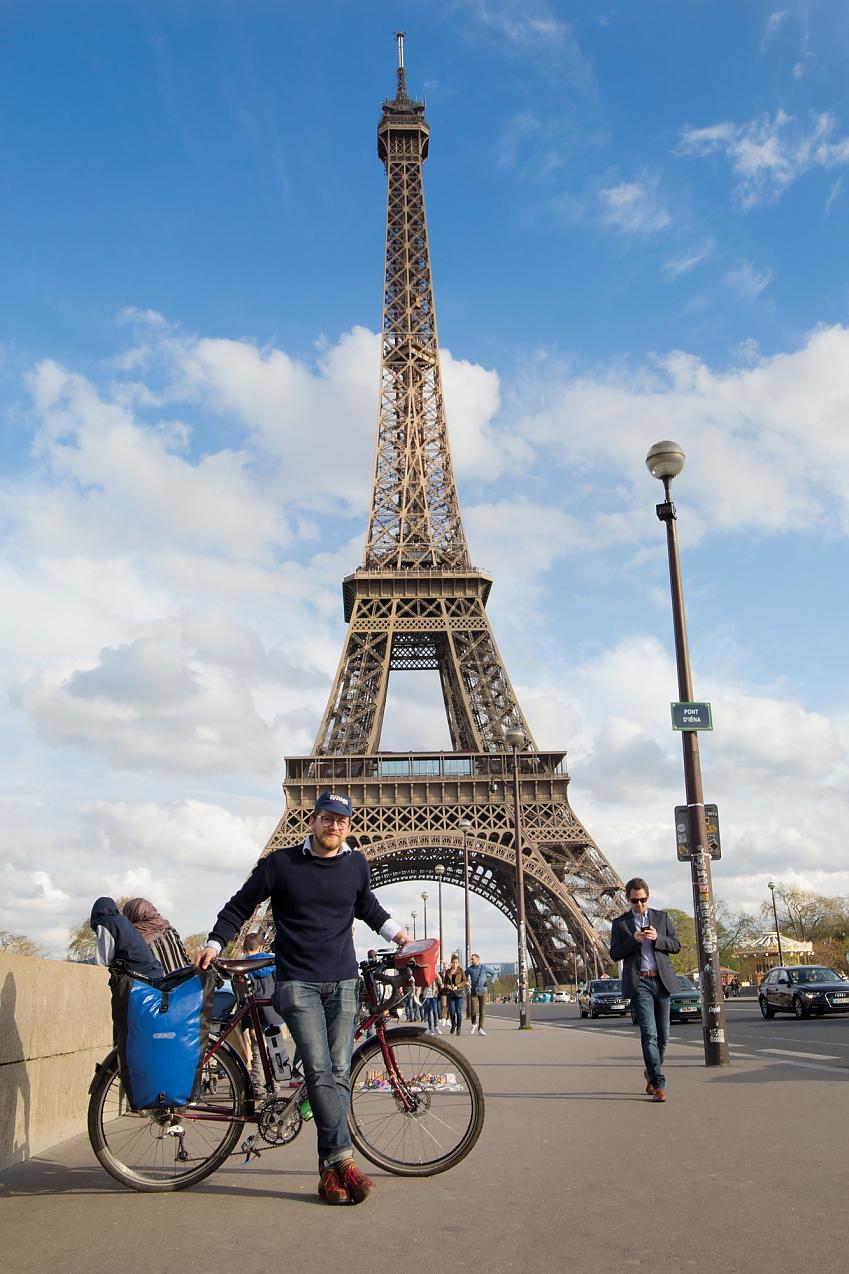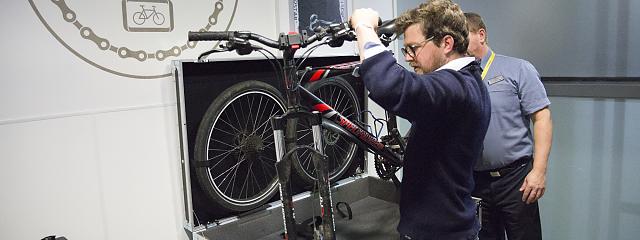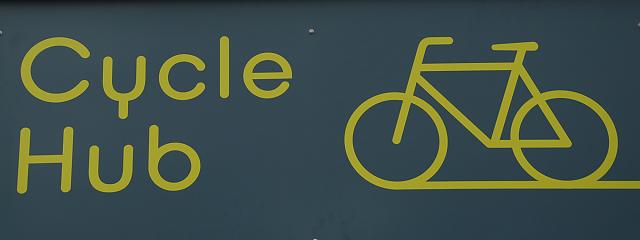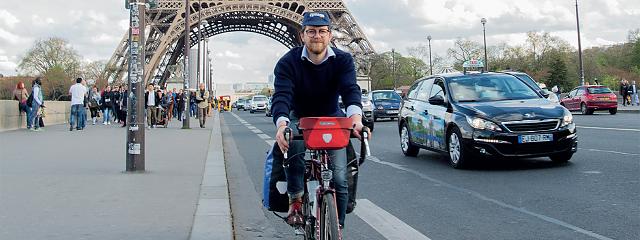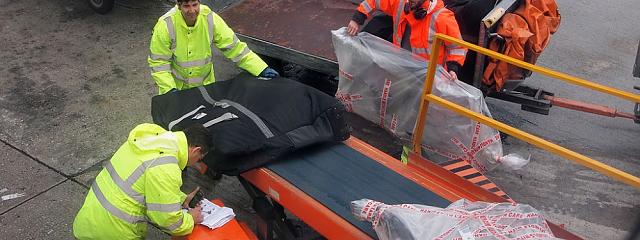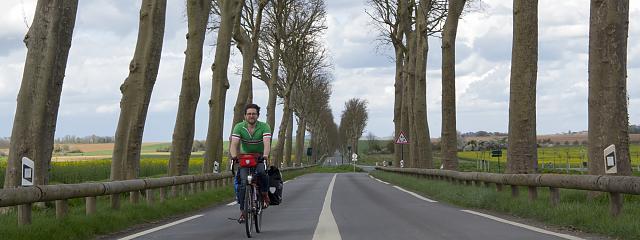
Taking your bike on Eurostar
Taking your bike on Eurostar
On a London morning, I escape the jostle of Euston Road and glance up at St Pancras International’s Victorian clocktower. In a few hours, I’ll be sipping coffee in Paris. There’s no rush. I’m not dragging a bagged bike out of the back of a taxi and balancing it on a wobbly-wheeled luggage trolley. I’ve arrived, as I’ll depart Gard du Nord, on two wheels. My Surly Disc Trucker is travelling with me unboxed. For that, I can thank everyone who supported our Zero stars for Eurostar campaign…
We launched this in October 2015 to put a stop to Eurostar’s plans to carry bikes only if they were boxed or bagged. We pulled together a coalition of European cycling organisations and galvanised over 10,000 cyclists into writing in protest to Eurostar CEO Nicolas Petrovic. The mayors of London, Paris and Brussels shared our outrage. By Friday 13 November, the controversial policy was dropped.
Boxed into a corner
Any euphoria over Eurostar’s decision was overshadowed later that day by the dreadful events in Paris’s Bataclan concert hall. But ever since November 2015, Cycling UK has been working with Eurostar on its cycle carriage policy. As a result, two assembled bikes and four Eurostar-boxed bikes can now travel per train.
I recently spoke to Eurostar’s Head of Public Affairs, Pierre Delalande, a keen cyclist himself. He was at pains to point out that the now-abandoned mandatory boxing policy wasn’t intended to discriminate against cyclists.
"When we changed our policy and asked passengers to put their bikes in a bag or box, we wanted to make it simple for customers to protect their bikes and for us to be able to carry more bikes," Pierre said. "We saw, however, that this concerned some passengers and we always listen carefully to feedback. After careful thought and planning, we took the decision to continue to allow assembled bikes on board, limited in numbers because of the space constraints we face."
And there’s the rub of the problem: space constraints. Despite overall tourism numbers to both Paris and Brussels dropping in 2016, Eurostar still transports over 10 million passengers a year. Those numbers are growing. Against this backdrop, cyclists and their bikes account for 0.09% of Eurostar passengers; around 9,000 bikes were carried in 2016.
While cyclists are a minority of passengers, Pierre said the mandatory boxing policy was meant to help facilitate cycle carriage, and I’m inclined to trust him. You need only look at the investment that has gone into the boxing service. Pierre was coy when I asked how much had been spent, saying it had run into ‘several hundreds of thousands of pounds’. That’s believable when you see and use the special areas set up in London and (less so) Paris, plus the extra staff laid on for the peak summer period, and time spent working with partners.
Despite Eurostar’s best intentions with mandatory boxing, the policy – which was presented as a ‘fait accompli’ – didn’t suit many cyclists. We were first tipped off about it and its repercussions by Cycling UK member Rosemary Dooley from Kendal, who contacted us from a tour in Portugal in September 2015. Rosemary began cycle touring in 2011 at the age of 63. With arthritis in her hands, the job of disassembling and reassembling her bike would spell the end to many of her future journeys, which relied predominantly on trains. She was glad the campaign was successful. "I am very pleased that I can still take my bike assembled on Eurostar,’ she said. ‘It would be impossible for me to enjoy touring without this facility. It’s essential."
Rosemary’s not alone in such thoughts, which is one of the reasons we campaigned to ensure fully-assembled bikes would always be allowed on Eurostar. It’s not just the leisure cyclist who might be put off by having to box their bike, but also the person who uses their bicycle as a mobility aid.
You can now reserve your bike space first and then book your main ticket."
Sam Jones, Cycling UK campaigner
On track again
Since November 2015, Eurostar has told Cycling UK repeatedly that there is strong commitment and investment to make it easier to carry fully-assembled bikes. Ed Lancaster of the European Cyclists’ Federation told me he’d noticed this. ‘It has been encouraging that, since the international campaign led by Cycling UK, Eurostar has been very open to working with cycle user groups, involving them directly in decisions that affect them.’
Cycling UK’s changes are already beginning to have an effect on Eurostar’s services. Frequent travellers like Rosemary have noted that booking a place for your bike has become easier. Previously, travellers were expected to have booked their train ticket and then hope there would be a bike space on the same train. You can now reserve your bike space first and then book your train ticket. Bike reservations still have to be booked separately via EuroDespatch, which is contracted by Eurostar to handle the oversized luggage, but the process is becoming simpler.
Following our discussions with Eurostar, the pricing structure for cycle carriage has also changed. Part of the argument for our original campaign was that if a bike is boxed, it’s no longer a bike but luggage. Accordingly, if you travel on Eurostar and use your own bike box or bag, you’ll pay the rate for oversized luggage (£25 per item) rather than the bicycle rate (£30).
If you’re making a return trip to Paris, Eurostar will look after your bike box or bag for you – so long as you arrange this before the date you travel. There are plans to roll this out to Brussels.
If you decide to use one of Eurostar’s bike boxes, the normal charge is still £30. However, we’ve negotiated a discount for Cycling UK members: you’ll pay £25 rather than £30. Eurostar say they have received positive feedback on the boxed option, with passengers applauding this as a ‘special service’ for cyclists.
One of the main benefits of our campaign, of course, is that you can book your assembled bike on Eurostar. That’s £30 if it travels with you or £25 if it goes on the next train.
Putting it into practice
It’s all very well writing about these benefits hypothetically, but what is the service like in practice? I decided to give it a go, using both the boxed and unboxed services. That’s why I was at St Pancras that morning.
On arrival at St Pancras with a bike, you follow the luggage and bike symbols until you see signs for EuroDespatch towards the rear of the station. It’s quite out of the way, but only a five-minute walk to the check-in once you’ve handed over your bike.
I was travelling with a photographer, so we had two bikes to transport: my touring bike, a Surly Disc Trucker; and his mountain bike, a Specialized Rockhopper. My bike has dynamo lights, mudguards and a rack, so we decided that mine would go unboxed. I removed its luggage and handed it over to the staff at EuroDespatch. It was all done in less time than it took to walk there.
I then turned to the task of dismantling the Rockhopper. I’m a complete novice at dismantling bikes – this was actually my first attempt! Fortunately, there’s a video showing what’s needed, and Cycling UK has provided advice for the step-by-step guides that will soon be displayed on the walls.
The disassembly/assembly area is just off to the side of the EuroDespatch counter. It’s a fully-equipped bike station. There’s a mechanic’s toolkit, bike stand, bench, and workmen’s gloves available on request, plus a basin for washing the muck off your hands afterwards. The boxes Eurostar provides are heavy duty, and assuming you pack your bike well, it’s not going to come to any harm. Staff are on hand to give pointers on disassembly if you need them. (They won’t help with reassembly for liability reasons.)
Despite my lack of workshop skills, I soon managed to remove the pedals, rack, wheels, and handlebar. I stuffed folded business cards between the disc brake pads to keep them in place. I left my penknife and other objects that might not have made it through security in the box. It took about 25 minutes all told, whereupon the boxed bike was taken off to the train.
I was surprised how easy and well-supported the whole process was. It’s nevertheless worth giving yourself plenty of time if you’re packing your bike, as I was lucky enough to be the only one boxing a bike that morning. It’s a fairly confined area, so if it’s busy and there are more than two of you at work, you’ll struggle for space.
Arrival in Paris
Having bid goodbye to our bikes, we set off for Customs. I was carrying a bar bag and two panniers, while the photographer had a couple of panniers and a backpack. Eurostar is fairly flexible with its luggage policy, but if you’re concerned – and perhaps travelling with front panniers too – I’d suggest taking two large tote bags and putting the panniers in those.
A pleasant train journey later, we arrived at Gard du Nord. Paris’s set-up feels at bit more ad hoc than London’s. You assemble your bike outside, albeit beneath an overhanging roof. In April, it was fine. In winter, it will be chilly! There is the benefit of more space to move about, and you have the same facilities (tools, stands, etc) as London, but no instructional guidance. At the time of writing, there are limited facilities at Brussels but Eurostar is planning to have a mobile bike station there by the time you read this.
Overall, I am impressed by the lengths Eurostar has gone to to ensure it can carry more cycles while coping with increasing passenger numbers. They say they’re always looking to improve on this service, and we’re keen to help them do so. Please send us any suggestions and we’ll pass them on.Baggage allowances
Peak cycle carriage is April to August, so for trips then book as early as possible.
Normal bikes
• Assembled bike: £30 for same train, £25 for next train
• In a Eurostar box: £30 normally, £25 for Cycling UK members
• In your own box or bike bag: £25
Folding bikes
If the largest dimension when folded is less than 85cm, a folding bike can travel on any service provided it has a protective case covering the whole bike. If it’s larger than this when folded, it needs to go with EuroDespatch as per a normal bike.
Ebikes, tandems, trikes and recumbents
Eurostar can’t guarantee the carriage of less conventional cycles, but have told us they will "always strive to accommodate specific requests". Call EuroDespatch (03448 225 822) with your bike’s dimensions to hand.
Connecting trains
If Eurostar is only the first part of your train journey, note that some French services like the fast TGV may only accept bagged or boxed bikes. Slower services usually take assembled bikes. For more information the website Freewheeling France has information on taking bikes on French trains.
The Deutsche Bahn website is useful for booking tickets for you and your bike, not just in Germany but across Europe. (Thanks to Cycling UK member Robin Bevis for these tips.)
Another great resource for train travel is seat61.com
Transport alternatives
Other ways to get to the Continent with your bike
Eurotunnel
Two services a day (currently 08.00 and 15.30 from the UK) for Eurotunnel's half-hour service running from Folkestone to Calais. Tickets are £20 each way for both you and your bike (no dismantling required), with up to six cyclists carried per service.
Flixbus
German-owned Flixbus can take you and your bike without you having to dismantle it, subject to space available. Leaves from London and Folkestone to a number of Continental destinations, with tickets from as little as £7.90 (De Panne) plus the £7 fee for cycle carriage. Bagged or boxed bikes also cost £7 and must not exceed 290cm (length plus girth, i.e. twice the width and twice the depth).
European Bike Express
Long-distance coach with a trailer for cycles (no dismantling required), with drop-off points throughout France through to northern Spain. Particularly useful from the north of England: it leaves from Stokesley, near Middlesbrough, and has 15 more pick-up points down the country on its way to Dover. Cycling UK members receive £8 discount for a return trip, and there’s an additional £10 off for online bookings on European Bike Express.
Ferry
Cycle carriage is usually free, and often you can be first to board and disembark. Facilities for storage vary, but generally involve lashing your bike to a rail on the car deck. We’ve had reports that DFDS and Brittany ferries have not allowed booking at peak times during the summer for cyclists and foot passengers, so check well in advance. For more information read this comprehensive list of ferry destinations.






